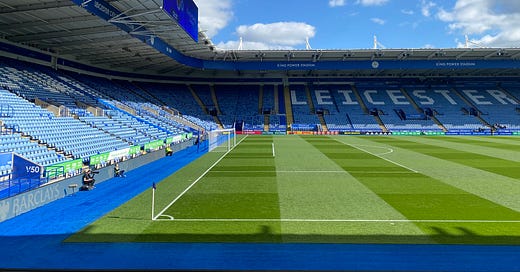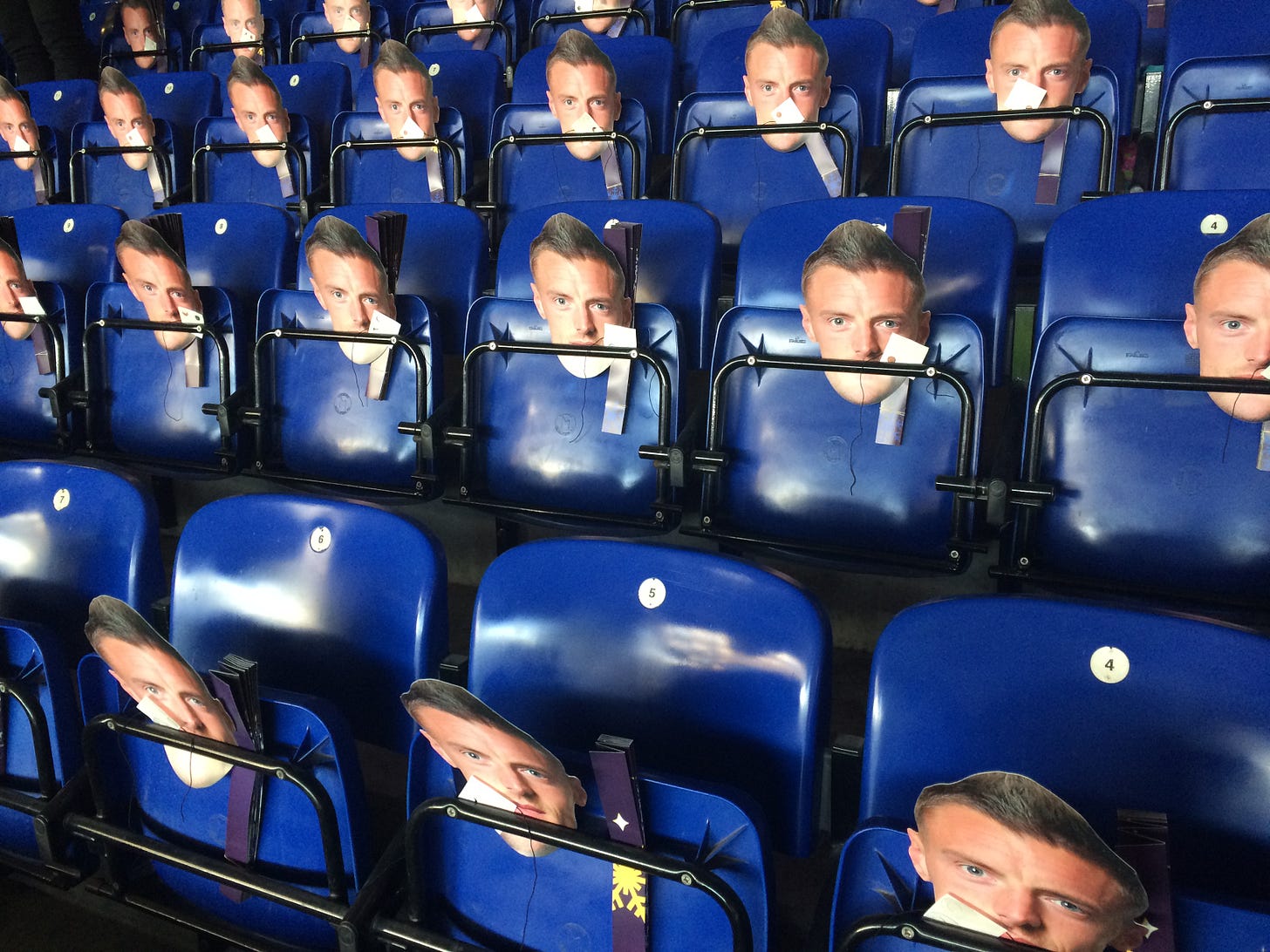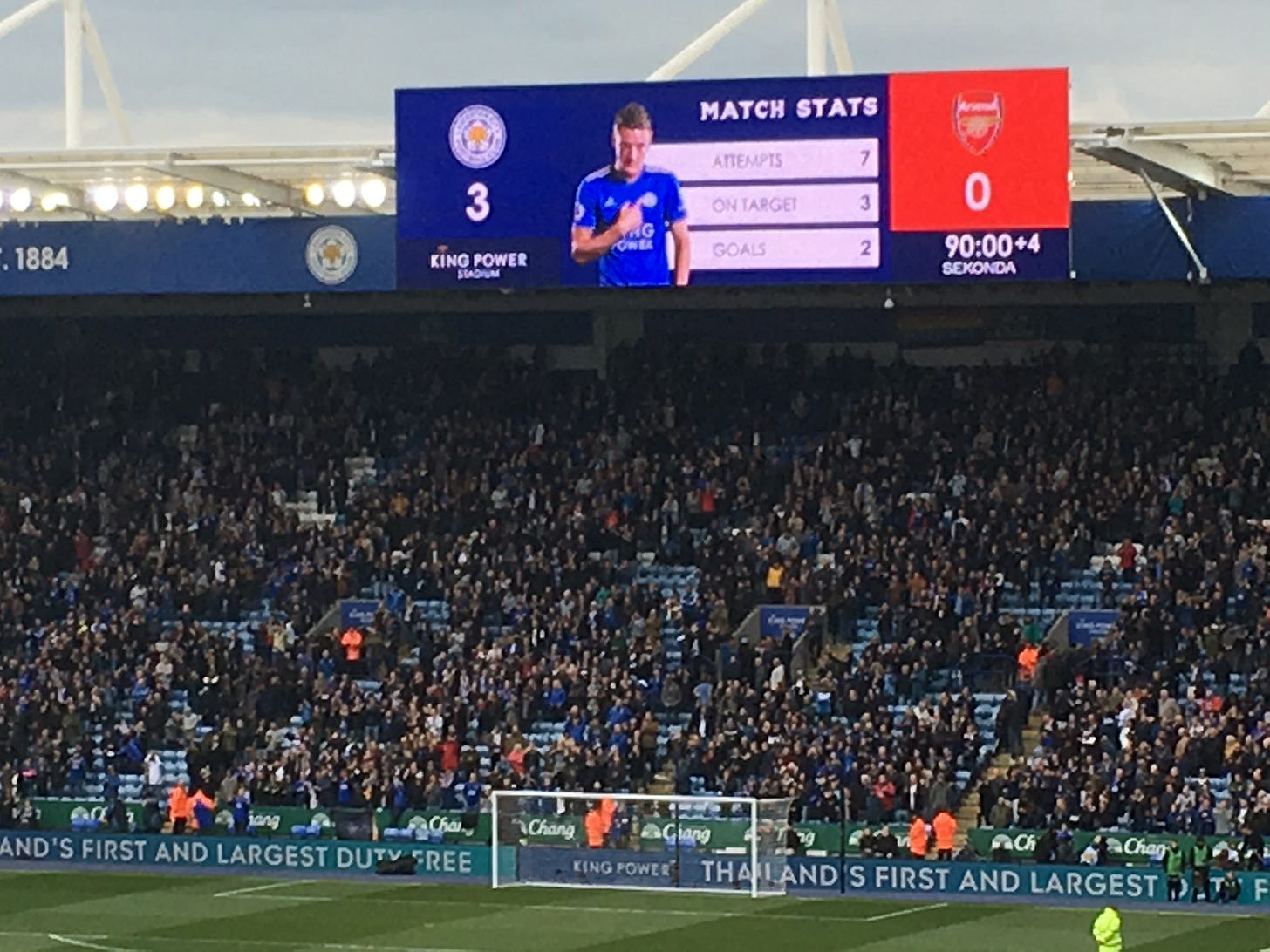I got a Leicester men’s season ticket in 2014, when the club returned to the Premier League under Nigel Pearson. Much has changed since then, but there have been two constants: first, my seat, high up in the north-west corner of the stadium; and second, Jamie Vardy leading the line. And soon there will only be one, and I’m not planning to move seats.
Because, at the age of 38, Jamie Vardy has announced he will be leaving Leicester City at the end of the current season. A fact I knew I’d have to process one day, but it’s still hard to believe it’s happening. He’s going out on a low, captaining the side during this miserable season of record-breaking terribleness. But he is still, unquestionably, a Leicester hero, with a good claim to be the greatest player in the club’s history1.
Most football fans would be accused of recency bias if they argued that a current player was greater than all the players in their various golden ages past. But for Leicester fans, the last decade - forget current woes for a minute - has unquestionably been the club’s greatest era, as we won both the league and the FA Cup, each for the first time (plus many other notable achievements), and Vardy has been an integral part of those successes. He is the only member of the title-winning squad still playing for Leicester, and when he has departed that will be it: the fraying threads connecting us to those glorious memories will finally be broken.
Vardy’s career has been strikingly unusual. He was born in Sheffield and grew up near Hillsborough, but after going through the youth system at Sheffield Wednesday he was released at the age of 16. He had non-footballing jobs for a few years, while rising through non-league football. Then, in May 2012, when he was 25, Leicester - then in the Championship - took the risk of paying £1m to Fleetwood for him; he had just helped the Lancashire team to get promoted to the Football League. That risk more than paid off; it was arguably the best-value million-pound transfer ever.
So Vardy was already 27 by the time he first played in the Premier League two years later, an age when most elite players are already well-established. Since then, he has scored more Premier League goals after the age of 30 than any other player (110 and counting - that is 17 more than Ian Wright, who is second on the list). He is now the ninth oldest goalscorer in Premier League history.
Perhaps because of his hard route to the top, Vardy connects with fans more than many players, who can seem aloof and distant, cocooned from their academy days. For younger fans, convinced they should still get a chance to play professionally, he offers hope (‘if he could do it, perhaps I still could?’). And for the rest of us, we love that he clearly enjoys football like a fan, mischievously riling opposition supporters in the way most of us would do given half a chance: the most Vardy thing ever is to celebrate a goal by flapping like an eagle in front of Crystal Palace fans or howl through his hands at a jeering Wolves contingent. Early last season, playing Bristol City, he scored a penalty in front of the Kop then ran the entire length of the pitch to show-off in front of the away fans, and in the home stands we loved him even more for it.
His relish is visibly increased if opposition fans - like those Bristol fans - had been trying to wind him up: ‘Jamie Vardy, your wife is a grass’, they still sing (to which, if appropriate, we respond on his behalf, ‘Jamie Vardy, he’s won more than you!’). I was at Bramall Lane in 2019 for Leicester’s win over newly-promoted Sheffield United, local rivals of Vardy’s boyhood club, when he mercilessly wound up the home fans after he scored the opening goal, an opposition striker they must love to hate2. There was no false modesty in the way he screamed abuse at the away end after scoring for the eleventh consecutive game in 2015, and he showed his love of goalscoring by doing a remarkably athletic celebratory somersault at Goodison Park after a goal against Everton in 2019. And it was Vardy who hosted the players’ party that evening in 2016 when Spurs failed to beat Chelsea, handing Leicester the Premier League; ‘Jamie Vardy’s having a party’ we sing. He comes across as irreverent and streetwise, with stories of drinking vodka and Red Bull (though of course he looks after himself very carefully, as Premier League players must).
It is also unusual for a player of Vardy’s quality to stay with a team like Leicester for so long. A club this size would not normally be able to keep someone that good, and no one would have been surprised (or particularly begrudged him) had he pushed for a move to a bigger club, where he could have earnt (even) more money, played with better players, and possibly scored more goals - though it’s unlikely he would have been the number one striker for so long at a bigger club, so maybe not that. There were strong rumours he was heading to Arsenal following the title win, but for whatever reason he decided to stick with us, and we are immensely grateful for that (‘Jamie Vardy’s magic, he wears a magic hat, he could have gone to Arsenal but he didn’t fancy that…’).
During his time with the club, he has played in many different styles under eight permanent managers, and adjusted his game in response, increasingly relying on tactical nous and positioning rather than speed. Nonetheless he has always been a self-confessed pest, buzzing round opposition defenders looking to create uncertainty, panic and errors; he must be (as many defenders have admitted) a nightmare to play against. His constant energy reflects an attitude that would have endeared him to fans even had he been only half the player he is.
Alongside the honours he has won with the team, Vardy’s list of individual achievements is remarkable. He has played 498 times for Leicester3, scoring 199 goals4 including 144 in the Premier League, making him the joint 14th most prolific player in Premier League history5. So, with three games to go, it is likely he will finish his Leicester career with 501 appearances and quite possible that he will score again to reach 200 goals6 (let’s hope so). It seems it was Vardy who decided to leave now rather than spend another season in the Championship, and that’s understandable, for all that I hoped he might stay another year.
He famously scored in eleven consecutive games in 2015, a Premier League record; only four players have ever scored in eight consecutive games, and Vardy is one of only two players to have done that twice, along with his current manager, Ruud van Nistelrooy. Vardy won the Premier League Golden Boot in 2019/20 with 23 goals, and he was one penalty miss (against Everton in the final home game) away from sharing it with Harry Kane in 2015/16 too. In the title-winning season he was the Premier League’s player of the season and came eighth in the Ballon d’Or (one place behind Mahrez). It barely needs to be said that this is not normal for a Leicester player.
He is also the only player ever to score two hat-tricks against teams managed by Pep Guardiola (only five other players, including Messi, Aguero and Mbappé, have scored even one). The first was in December 2016, soon after Guardiola had taken over at Manchester City, and while Leicester - then Premier League title holders - were going through a difficult period; but the 4-2 win was one of the most remarkable games I’ve been to - we were 2-0 up within five minutes.
The second hat-trick was at the Etihad in front of an empty stadium during Covid. His only other hat-trick in the Premier League was one of two by Leicester players (the other was Ayoze Pérez) in the record 9-0 demolition of Southampton in 2019.
Since I keep a geeky note of these things, I know that I have seen Vardy score 89 goals (so far)7, over four times as many as any other player8. He’s responsible for almost a quarter of all the goals I’ve seen Leicester score in the 229 games I’ve been to. Whatever happens in the coming decades of following the Foxes, I strongly doubt I will ever see another Leicester player come close to scoring as many as that.
Leicester fans were for years frustrated at the way Vardy often seemed to be underestimated and slightly patronised, though I don’t think he is any more. Most famously, Michael Owen said in late 2016, as Vardy went on one of those barren runs that every striker has to endure sometimes, that he was a ‘lucky striker’ and not a ‘natural finisher’. Look at this highlights video of Vardy’s 20 best Premier League goals, and come to your own conclusion: I think it was an absurd thing to say, even at the time9.
What that video shows is the exceptional skilfulness and imagination Vardy brings to the football pitch: the ability to redirect balls apparently at will, and to use his speed and strength to find or make goalscoring opportunities where normal players would have assumed they hadn’t got a chance. I have never played football, but even I can sense how difficult some of those scoring chances were.
For example, that goal at West Brom (he loved scoring at the Hawthorns) in March 2018 (number 12 in the video), when he seemed to reprogram a long ball from Mahrez with his left foot and persuade it to arrow itself past the keeper into the goal, is so good that it was Match of the Day’s Goal of the Season. It is incomprehensible to me how anyone could make that happen, particularly at that speed.
I didn’t see that goal in person, unfortunately (though in real time I’m not sure I’d have appreciated how good it was). But I was there for twelve of the goals in that video. The strikes against Spurs (number 11) and Bournemouth (number 13) were both scored right in front of where I was sitting, at the north end of the King Power stadium. The way Vardy got onto both of those long passes - for the one against Spurs, he leaps like a salmon to meet an Albrighton cross; for the Bournemouth one, Chilwell played his assist from just outside his own penalty area - and flicked them over the keeper to land with aesthetic perfection in the back corner of the net was breathtaking at the time, and they get better with every rewatch.
And then there’s that famous goal against Liverpool (number 7) in the title-winning season, which remains the most sensational goal I have seen live: it was up the far end of the pitch, so I was more-or-less behind the ball as it flew from Vardy’s foot on the right wing, over Mignolet and into the net, and I could not believe what I had seen. I remember driving home from the match that evening desperate to watch a replay (they didn’t do them in the stadium then), to confirm whether what I thought had happened had indeed happened, and it had.
Three Vardy goals against Manchester United stick in my memory, including numbers 1 and 5 from the video. The first was in the famous 5-3 comeback win in September 2014, only three games into my time as a season ticket holder, which remains - despite everything that’s happened since - one of the two best games I’ve ever been to. 3-1 down after 60 minutes, Leicester scored four goals in half an hour - Vardy scored or assisted all of Leicester’s goals that afternoon - as the King Power rocked.
The following year, Vardy scored against Manchester United again to take that record of scoring in eleven consecutive games. I wrote about that goal here10.
Vardy’s fiftieth Premier League goal, which he scored just before Christmas 2017, was also against Manchester United. It sticks in my memory even though it wouldn’t make anyone’s list of his greatest. I can’t even find it on an official video (it’s about 50 seconds into the unofficial highlights below), but it was one of his most entertaining and still makes me smile. It was another that was scored just in front of me. After a long ball forward, Riyad Mahrez found himself one-on-one with Manchester United defender Phil Jones in the area and stopped the ball, playing cat and mouse for what seemed like minutes (you felt he had time to lean back in a chair nonchalantly and put his feet up), until Vardy arrived to his left with another Manchester United defender desperately trying to keep up with him; and with delicious insouciance Mahrez stroked the ball forward into Vardy’s path and he inevitably pushed it past the keeper. The instinctive understanding Vardy had with Mahrez - on the face of it, two very different characters - was just one of the many productive partnerships he’s formed over his time at the King Power.
(Incidentally Vardy’s 100th Premier League goal, against Palace in front of a Covid-emptied King Power stadium, was possibly the easiest he’s ever scored).
Another goal that makes me smile was the one against Arsenal in April 2019 when Vardy put the ball onto the crossbar after running between the defenders onto a Schmeichel goal-kick, and then headed in the rebound. A Route One’s Route One goal.
The goal against Arsenal later that same year (number 15 in that video) is a poignant reminder of just how good Leicester were in the early part of the Brendan Rodgers era: Ricardo, Barnes and Tielemans passed the ball round the Arsenal defence like peak Barcelona before Vardy slotted home. We probably didn’t appreciate it at the time, but I am not sure I will ever again see my team play that well. It was probably never going to last, but our fall since has been sadly precipitous.
That top 20 video only shows Premier League goals, but Vardy has scored over 50 goals in other competitions: in the Championship (including 18 last season, during which he celebrated his 37th birthday), cup competitions and Europe (including in the Champions League quarter final against Atletico Madrid eight years ago, the other of the two greatest games I have ever been to). He also scored seven goals for England in 26 appearances between 2015 and 2018, though he was never an integral part of the national team’s set-up.
And then just yesterday Vardy scored his 199th goal for Leicester, against a woefully poor Southampton, who are struggling to pass Derby’s unwanted record of earning just 11 points in a Premier League season (they have three games to get another point, and on that showing I would not be at all confident that they will manage it - Southampton made us look almost good at times). His goal, the first of the game, was an archetypal Vardy strike, a left-footed thump into the roof of the net from a fast cross11. It’s the sort of goal we would expect a player of Vardy’s quality to be able to score, but as Alan Shearer said on Match of the Day, it was a very difficult thing to do, given the speed the ball was coming at him, and the need to get the direction and power right; he’s still got it. Though Vardy has scored more impressive goals, this one was special because it was the first home league goal Leicester had scored for a million years since mid-December, and also it could be the last Vardy goal for Leicester, or at least the last the home crowd ever sees; he will only play one more game at the King Power, against Ipswich in a fortnight, and I really hope he scores then12, but I will savour yesterday’s in case he doesn’t13.
No football career is perfect, of course; highlights videos miss the misses, the frustrations, the difficult periods, the criticism, and the misjudgements. In particular, he didn’t seem to get on with Claude Puel, whose managerial stint at Leicester is as forgotten as it deserves; I was at the away game against Spurs in early 2019, when they were playing at Wembley as their new stadium was being built, when Puel started Vardy on the bench - to the bewilderment of fans, and no doubt the anger of Vardy himself - and he was substituted in the second half to promptly miss a penalty. Puel was sacked shortly after that.
Vardy leaves as the club is going through a rough patch. This has been a woefully poor season, and the captain has only managed to score eight league goals himself. This is not really Vardy’s fault: no Premier League team should be relying on a 38-year-old to lead the line, but a fading Jamie Vardy has still been better than any of the alternatives14.
There will be cheers and tears at the Ipswich game in two weeks, as the KP says a final goodbye to its hero. Then we will need to start wistfully putting the long memories of his time there into the bank of reminiscences that helps make football fandom what it is. And there will no doubt be a campaign for a statue outside the stadium, which will surely be erected some day: it will probably capture him wheeling away in celebration, perhaps cupping his hand to his ear or pointing to the name on the back of his shirt. But he will be gone.
Leicester without Jamie Vardy will be different and strange at first. Another man will have to take his place as Leicester’s main striker, whether or not he dares wear the number 9 shirt. I hope it will not weigh too heavily on him: fans know we are lucky to have witnessed the Vardy era, and that he has been a one-off; we will not see his like again. And as the echoes fade on those 199 cheers, and the smiling memories get replayed and retold (and embellished), we know there will always be new memories to come, of different times.
There will be agonies and disappointments too - this is football after all - but we’ll forever be able to smile through them a little more than before, because Vardy and his goals were ours. We were there, and we always will be.
I made the case for Vardy on BBC Radio Leicester back in the summer of 2018, when they did a series to find Leicester’s greatest ever player. I would have been astonished then had someone said that he was still less than halfway through his time at the club, with an FA Cup still to win. From memory Vardy ended up winning the series final against goalkeeper Gordon Banks, who was (as is often forgotten) a Leicester player when he won the World Cup in 1966, though he left the club the following year. [16.5.25: I have just checked Twitter and my memory was right:]
In a later match at an empty Bramall Lane, during Covid, Vardy destroyed a corner flag during a rather over-exuberant goal celebration. Given that the flag had a rainbow on it, some interpreted that as him disliking football’s diversity campaigns. Quite the opposite: after the match, Vardy rescued and signed the flag and sent it to the Foxes Pride group with a message of support.
He is third on the all-time list, after Graham Cross, a centre back who played from 1960-76, and Adam Black, whose career was forty years before that.
He’s third on the goalscoring list too, after two Arthurs, Chandler and Rowley, who played pre-war and in the 1950s respectively.
Yes I know football didn’t start in 1992.
Two more goals and Vardy would draw level with Teddy Sheringham in 13th place - Sheringham tops that list of the oldest Premier League goalscorers.
And I’ve seen him score 72 Premier League goals, exactly half those he’s scored in the competition.
I have seen him score more goals than the next five players on the list - Barnes, Mahrez, Maddison, Ulloa and Daka - put together. And yes I am quite surprised to see Daka in that company.
Owen scored 150 Premier League goals, a total that it once seemed plausible that Vardy would match, which would have been poetic; though that would now require him to get six goals in three games, which is (sadly) unlikely.
Added 16.5.25: in the run-up to what will be Vardy’s final (and 500th) game for Leicester, at the King Power against Ipswich on 18th May, the club recorded this interview with Martin Tyler, where they discussed (among other things) Tyler’s commentary on Vardy’s ‘eleven it’s heaven’ goal.
Bilal El Khannouss, who assisted that goal, was just eight years old when Vardy joined Leicester. Jeremy Monga, who was a substitute and played alongside Vardy for 15 minutes, was two.
Spoiler: he did (added 24.5.25).
Vardy did an interview after the match with Gary Lineker, another legendary Leicester striker, which I think says quite a lot about him; beneath the cheeky chappy act he is more thoughtful than he is sometimes given credit for.
There are rumours he might go to Wrexham, who will also be in the Championship next season. It would be very strange for fans, and I’m sure for him, if he came back to the King Power in opposition colours, but let’s worry about that if it happens.












